英语中的悖论
- 格式:docx
- 大小:17.72 KB
- 文档页数:3

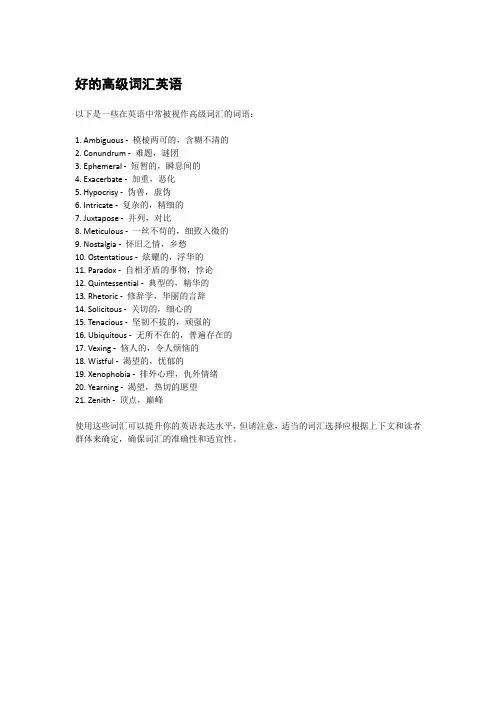
好的高级词汇英语
以下是一些在英语中常被视作高级词汇的词语:
1. Ambiguous - 模棱两可的,含糊不清的
2. Conundrum - 难题,谜团
3. Ephemeral - 短暂的,瞬息间的
4. Exacerbate - 加重,恶化
5. Hypocrisy - 伪善,虚伪
6. Intricate - 复杂的,精细的
7. Juxtapose - 并列,对比
8. Meticulous - 一丝不苟的,细致入微的
9. Nostalgia - 怀旧之情,乡愁
10. Ostentatious - 炫耀的,浮华的
11. Paradox - 自相矛盾的事物,悖论
12. Quintessential - 典型的,精华的
13. Rhetoric - 修辞学,华丽的言辞
14. Solicitous - 关切的,细心的
15. Tenacious - 坚韧不拔的,顽强的
16. Ubiquitous - 无所不在的,普遍存在的
17. Vexing - 恼人的,令人烦恼的
18. Wistful - 渴望的,忧郁的
19. Xenophobia - 排外心理,仇外情绪
20. Yearning - 渴望,热切的愿望
21. Zenith - 顶点,巅峰
使用这些词汇可以提升你的英语表达水平,但请注意,适当的词汇选择应根据上下文和读者群体来确定,确保词汇的准确性和适宜性。
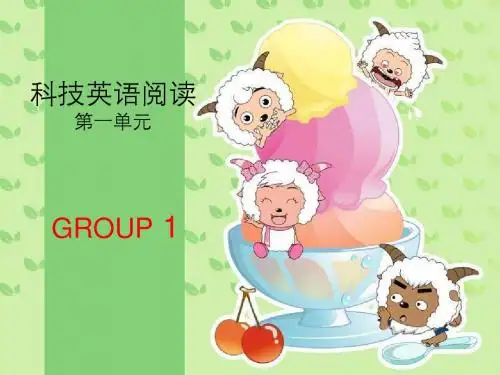
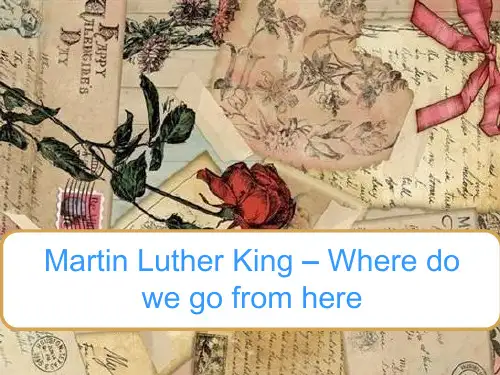
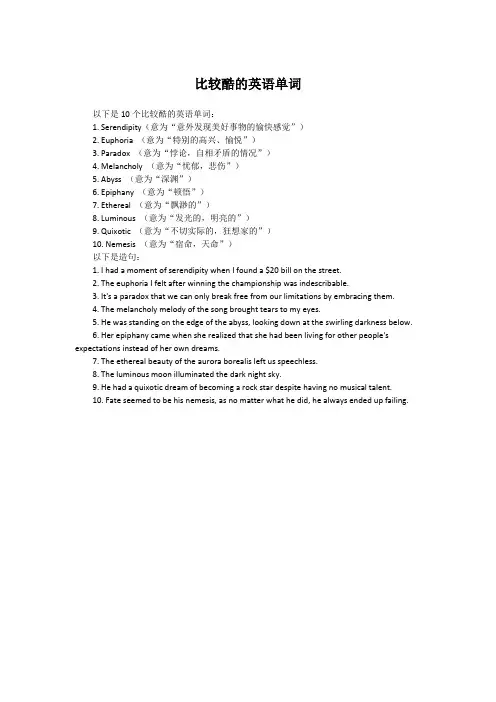
比较酷的英语单词以下是10个比较酷的英语单词:1. Serendipity(意为“意外发现美好事物的愉快感觉”)2. Euphoria (意为“特别的高兴、愉悦”)3. Paradox (意为“悖论,自相矛盾的情况”)4. Melancholy (意为“忧郁,悲伤”)5. Abyss (意为“深渊”)6. Epiphany (意为“顿悟”)7. Ethereal (意为“飘渺的”)8. Luminous (意为“发光的,明亮的”)9. Quixotic (意为“不切实际的,狂想家的”)10. Nemesis (意为“宿命,天命”)以下是造句:1. I had a moment of serendipity when I found a $20 bill on the street.2. The euphoria I felt after winning the championship was indescribable.3. It's a paradox that we can only break free from our limitations by embracing them.4. The melancholy melody of the song brought tears to my eyes.5. He was standing on the edge of the abyss, looking down at the swirling darkness below.6. Her epiphany came when she realized that she had been living for other people's expectations instead of her own dreams.7. The ethereal beauty of the aurora borealis left us speechless.8. The luminous moon illuminated the dark night sky.9. He had a quixotic dream of becoming a rock star despite having no musical talent.10. Fate seemed to be his nemesis, as no matter what he did, he always ended up failing.。
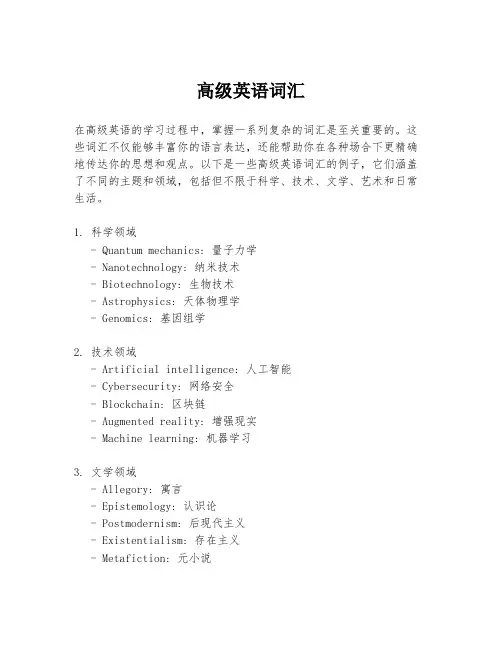
高级英语词汇在高级英语的学习过程中,掌握一系列复杂的词汇是至关重要的。
这些词汇不仅能够丰富你的语言表达,还能帮助你在各种场合下更精确地传达你的思想和观点。
以下是一些高级英语词汇的例子,它们涵盖了不同的主题和领域,包括但不限于科学、技术、文学、艺术和日常生活。
1. 科学领域- Quantum mechanics: 量子力学- Nanotechnology: 纳米技术- Biotechnology: 生物技术- Astrophysics: 天体物理学- Genomics: 基因组学2. 技术领域- Artificial intelligence: 人工智能- Cybersecurity: 网络安全- Blockchain: 区块链- Augmented reality: 增强现实- Machine learning: 机器学习3. 文学领域- Allegory: 寓言- Epistemology: 认识论- Postmodernism: 后现代主义- Existentialism: 存在主义- Metafiction: 元小说4. 艺术领域- Aesthetics: 美学- Baroque: 巴洛克风格- Cubism: 立体主义- Impressionism: 印象派- Surrealism: 超现实主义5. 日常生活- Ambiguity: 模糊不清- Serendipity: 意外发现- Ineffable: 难以言喻的- Ephemeral: 短暂的- Paradox: 悖论6. 经济领域- Inflation: 通货膨胀- Deflation: 通货紧缩- Fiscal policy: 财政政策- Monopolistic competition: 垄断竞争 - Subsidies: 补贴7. 法律领域- Jurisprudence: 法学- Tort: 侵权行为- Litigation: 诉讼- Precedent: 先例- Statute: 法规8. 心理学领域- Cognitive dissonance: 认知失调- Empathy: 同理心- Neurosis: 神经症- Phobia: 恐惧症- Psychoanalysis: 精神分析9. 环境科学- Biodiversity: 生物多样性- Ecosystem: 生态系统- Sustainability: 可持续性- Deforestation: 森林砍伐- Global warming: 全球变暖10. 社会政治- Democracy: 民主- Socialism: 社会主义- Anarchy: 无政府状态- Pluralism: 多元主义- Human rights: 人权这些词汇只是高级英语词汇的一小部分,但它们可以作为你扩展词汇量和提高语言能力的起点。
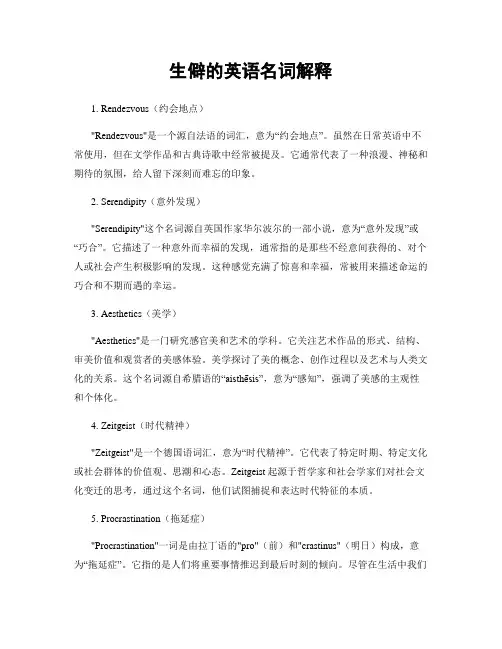
生僻的英语名词解释1. Rendezvous(约会地点)"Rendezvous"是一个源自法语的词汇,意为“约会地点”。
虽然在日常英语中不常使用,但在文学作品和古典诗歌中经常被提及。
它通常代表了一种浪漫、神秘和期待的氛围,给人留下深刻而难忘的印象。
2. Serendipity(意外发现)"Serendipity"这个名词源自英国作家华尔波尔的一部小说,意为“意外发现”或“巧合”。
它描述了一种意外而幸福的发现,通常指的是那些不经意间获得的、对个人或社会产生积极影响的发现。
这种感觉充满了惊喜和幸福,常被用来描述命运的巧合和不期而遇的幸运。
3. Aesthetics(美学)"Aesthetics"是一门研究感官美和艺术的学科。
它关注艺术作品的形式、结构、审美价值和观赏者的美感体验。
美学探讨了美的概念、创作过程以及艺术与人类文化的关系。
这个名词源自希腊语的“aisthēsis”,意为“感知”,强调了美感的主观性和个体化。
4. Zeitgeist(时代精神)"Zeitgeist"是一个德国语词汇,意为“时代精神”。
它代表了特定时期、特定文化或社会群体的价值观、思潮和心态。
Zeitgeist起源于哲学家和社会学家们对社会文化变迁的思考,通过这个名词,他们试图捕捉和表达时代特征的本质。
5. Procrastination(拖延症)"Procrastination"一词是由拉丁语的"pro"(前)和"crastinus"(明日)构成,意为“拖延症”。
它指的是人们将重要事情推迟到最后时刻的倾向。
尽管在生活中我们都可能有这样的经历,但它在心理学中被看作一种负面行为模式,会导致压力、焦虑和效率低下。
6. Schadenfreude(幸灾乐祸)"Schadenfreude"是一个源自德语的名词,意为“幸灾乐祸”。
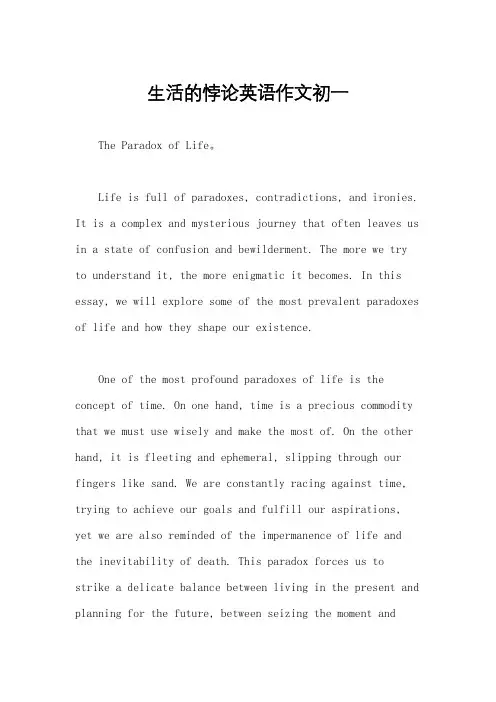
生活的悖论英语作文初一The Paradox of Life。
Life is full of paradoxes, contradictions, and ironies. It is a complex and mysterious journey that often leaves us in a state of confusion and bewilderment. The more we try to understand it, the more enigmatic it becomes. In this essay, we will explore some of the most prevalent paradoxes of life and how they shape our existence.One of the most profound paradoxes of life is the concept of time. On one hand, time is a precious commodity that we must use wisely and make the most of. On the other hand, it is fleeting and ephemeral, slipping through our fingers like sand. We are constantly racing against time, trying to achieve our goals and fulfill our aspirations, yet we are also reminded of the impermanence of life and the inevitability of death. This paradox forces us tostrike a delicate balance between living in the present and planning for the future, between seizing the moment andsavoring the moment.Another paradox of life is the pursuit of happiness. We are constantly seeking happiness and fulfillment, yet the more we chase after it, the more elusive it becomes. The paradox lies in the fact that happiness cannot be pursued directly; it is a byproduct of living a meaningful and purposeful life. When we focus too much on our own happiness, we often end up feeling empty and dissatisfied. However, when we shift our attention to serving others and contributing to the greater good, we find that happiness comes to us naturally.The paradox of love is another enigma of life. We crave love and connection, yet we are often afraid of getting hurt. We long for intimacy and companionship, yet we fear vulnerability and rejection. Love is a paradox because it requires us to open our hearts and expose our deepest emotions, even though there is no guarantee of reciprocity. It is a leap of faith that demands courage and resilience, yet it is also the most rewarding and transformative experience that life has to offer.The paradox of success is perhaps the most pervasive in modern society. We are taught to strive for success and achieve greatness, yet the pursuit of success often leads to stress, anxiety, and burnout. We are driven by ambition and competition, yet we are also plagued by self-doubt and fear of failure. Success is a paradox because it demands hard work and sacrifice, yet it also requires humility and gratitude. It is a delicate balancing act between ambition and contentment, between achievement and fulfillment.In conclusion, life is a tapestry of paradoxes that challenge and enrich our existence. The paradoxes of time, happiness, love, and success remind us that life is a delicate dance of contradictions and complexities. Instead of trying to unravel these paradoxes, we must learn to embrace them and find meaning in the midst of uncertainty. It is through grappling with these paradoxes that we grow, evolve, and ultimately find our place in the world.。
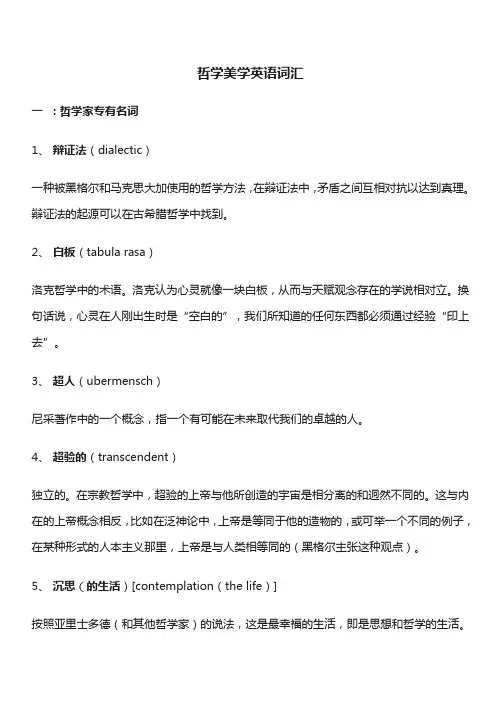
哲学美学英语词汇一:哲学家专有名词1、辩证法(dialectic)一种被黑格尔和马克思大加使用的哲学方法,在辩证法中,矛盾之间互相对抗以达到真理。
辩证法的起源可以在古希腊哲学中找到。
2、白板(tabula rasa)洛克哲学中的术语。
洛克认为心灵就像一块白板,从而与天赋观念存在的学说相对立。
换句话说,心灵在人刚出生时是“空白的”,我们所知道的任何东西都必须通过经验“印上去”。
3、超人(ubermensch)尼采著作中的一个概念,指一个有可能在未来取代我们的卓越的人。
4、超验的(transcendent)独立的。
在宗教哲学中,超验的上帝与他所创造的宇宙是相分离的和迥然不同的。
这与内在的上帝概念相反,比如在泛神论中,上帝是等同于他的造物的,或可举一个不同的例子,在某种形式的人本主义那里,上帝是与人类相等同的(黑格尔主张这种观点)。
5、沉思(的生活)[contemplation(the life)]按照亚里士多德(和其他哲学家)的说法,这是最幸福的生活,即是思想和哲学的生活。
6、存在的世界(world of Being)柏拉图形而上学中的术语,指理想中的“形式”的世界,这个世界是没有变化的,我们只能通过理性和思想来认识这个世界。
7、单子(monad)莱布尼茨用来指一切不变事物的最终组成部分的非物质实体,上帝是唯一一个不是被创造的单子,他作为自我封闭的(“无窗的”)的先定实体创造了所有其他单子。
8、狄奥尼索斯式的(尼采)[Dionysian(Nietzsche)]艺术、精力和意志中的非理性原则。
9、公意(卢梭)[general will(Rousseau)]一个民族集体的愿望和决定。
10、信仰的飞跃(leap of faith)克尔凯郭尔的用语。
他认为一个人不可能证明他所信仰的东西。
11、海森堡不确定性原理(物理学中的)[Heisenberg uncertainty principle(in physics)]一个亚原子粒子的运动和位置不可能同时确定。
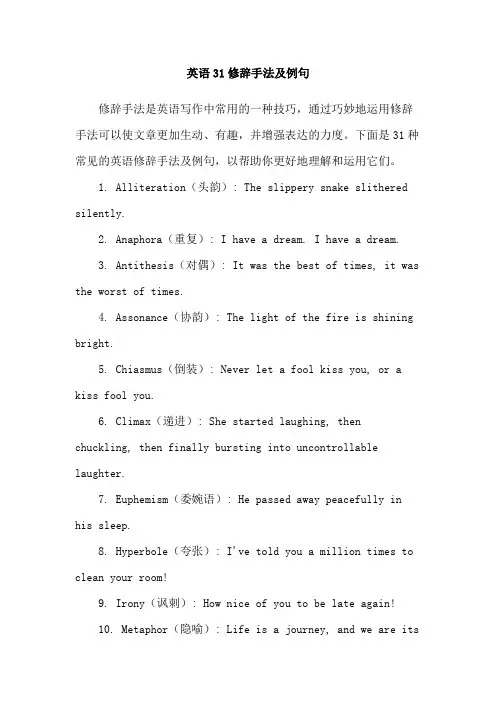
英语31修辞手法及例句修辞手法是英语写作中常用的一种技巧,通过巧妙地运用修辞手法可以使文章更加生动、有趣,并增强表达的力度。
下面是31种常见的英语修辞手法及例句,以帮助你更好地理解和运用它们。
1. Alliteration(头韵): The slippery snake slithered silently.2. Anaphora(重复): I have a dream. I have a dream.3. Antithesis(对偶): It was the best of times, it was the worst of times.4. Assonance(协韵): The light of the fire is shining bright.5. Chiasmus(倒装): Never let a fool kiss you, or a kiss fool you.6. Climax(递进): She started laughing, then chuckling, then finally bursting into uncontrollable laughter.7. Euphemism(委婉语): He passed away peacefully in his sleep.8. Hyperbole(夸张): I've told you a million times to clean your room!9. Irony(讽刺): How nice of you to be late again!10. Metaphor(隐喻): Life is a journey, and we are itspassengers.11. Onomatopoeia(拟声): The bees buzzed by my ear.12. Oxymoron(矛盾修饰): The silence was deafening.13. Parallelism(并列结构): She likes cooking, swimming, and reading.14. Personification(拟人): The flowers danced in the wind.15. Pun(双关): I used to be a baker, but I couldn't make enough dough.16. Repetition(重复): I must do it. I will do it. I can do it.17. Rhetorical question(修辞疑问): Who can resist the aroma of freshly baked bread?18. Simile(明喻): Her smile is as bright as the sun.19. Synecdoche(提喻法): The pen is mightier than the sword.20. Allusion(典故): She had a Mona Lisa smile on her face.21. Apostrophe(呼唤): Oh, love, why do you torment me so?22. Consonance(协音): The ship has sailed to the farthest shores.23. Enjambment(跨行): I wandered lonely as a cloudThat floats on high o'er vales and hills.24. Litotes(婉言): She is not unkind.25. Metonymy(转喻): The pen is mightier than the sword.26. Paradox(悖论): The more you know, the more you don't know.27. Periphrasis(迂回说法): The city that never sleeps (New York City).28. Sarcasm(讽刺): Oh, you're so clever, I can hardly stand it.29. Symbolism(象征): The dove represents peace.30. Understatement(轻描淡写): It's just a little cut, no need to make a fuss.31. Zeugma(两义): She lost her keys and her temper.这些修辞手法在英语写作中非常常见,它们可以使文章更加生动有趣,同时也能够增强表达的力度。
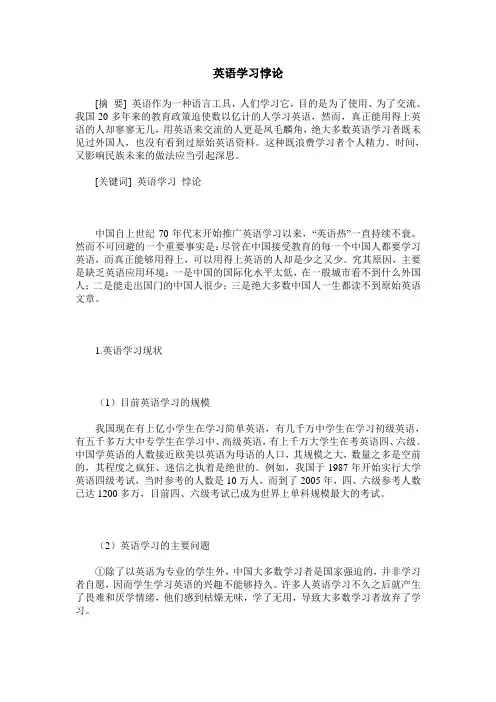
英语学习悖论[摘要] 英语作为一种语言工具,人们学习它,目的是为了使用、为了交流。
我国20多年来的教育政策迫使数以亿计的人学习英语,然而,真正能用得上英语的人却寥寥无几,用英语来交流的人更是凤毛麟角,绝大多数英语学习者既未见过外国人,也没有看到过原始英语资料。
这种既浪费学习者个人精力、时间,又影响民族未来的做法应当引起深思。
[关键词] 英语学习悖论中国自上世纪70年代末开始推广英语学习以来,“英语热”一直持续不衰。
然而不可回避的一个重要事实是:尽管在中国接受教育的每一个中国人都要学习英语,而真正能够用得上,可以用得上英语的人却是少之又少。
究其原因,主要是缺乏英语应用环境:一是中国的国际化水平太低,在一般城市看不到什么外国人;二是能走出国门的中国人很少;三是绝大多数中国人一生都读不到原始英语文章。
1.英语学习现状(1)目前英语学习的规模我国现在有上亿小学生在学习简单英语,有几千万中学生在学习初级英语,有五千多万大中专学生在学习中、高级英语,有上千万大学生在考英语四、六级。
中国学英语的人数接近欧美以英语为母语的人口,其规模之大,数量之多是空前的,其程度之疯狂、迷信之执着是绝世的。
例如,我国于1987年开始实行大学英语四级考试,当时参考的人数是10万人,而到了2005年,四、六级参考人数已达1200多万,目前四、六级考试已成为世界上单科规模最大的考试。
(2)英语学习的主要问题①除了以英语为专业的学生外,中国大多数学习者是国家强迫的,并非学习者自愿,因而学生学习英语的兴趣不能够持久。
许多人英语学习不久之后就产生了畏难和厌学情绪,他们感到枯燥无味,学了无用,导致大多数学习者放弃了学习。
②我国的英语教学只注重解释语法和翻译,很少与实际联系,也很少与中国国情挂钩。
从初中到高中到大学,甚至到研究生学习,英语教学课堂上基本上是以讲解语法为主,而且讲的难度越深越好,讲解之后便是翻译出来,然而就是举一反三,一堂课大部分时间是教师讲、学生听。
20种英语修辞手法整理英语修辞手法是英语写作中常用的一种技巧,通过巧妙地运用修辞手法,可以增加文章的表现力和吸引力,使读者更加有兴趣阅读。
本文将整理介绍20种常见的英语修辞手法。
一、比喻(Metaphor)比喻是一种常见的修辞手法,用于通过将两个不相干的事物进行比较,以增强表达的效果。
例如:“他是一只勇敢的狮子。
”二、暗喻(Implicit Metaphor)暗喻是一种通过隐晦的方式进行比喻的修辞手法,不直接明示被比较的事物。
例如:“他是个夜猫子。
”三、拟人(Personification)拟人是将非人事物赋予人的特质或行为的修辞手法。
例如:“大地张开了它温暖的怀抱。
”四、夸张(Hyperbole)夸张是一种通过夸大事物的说法来产生强烈效果的修辞手法。
例如:“我等了一万年。
”五、对比(Contrast)对比是一种通过将两个不同或相反的事物进行相互对比,以突出差异或强调某一方面的修辞手法。
例如:“他的言行恰恰相反。
”六、排比(Parallelism)排比是一种通过对句子或短语进行平行结构的修辞手法,以强调重点或增加语句的节奏感。
例如:“奋斗,拼搏,追求,努力。
”七、倒装(Inversion)倒装是一种颠倒语序的修辞手法,常常用于疑问句或为了强调某一部分。
例如:“Never have I seen such a beautiful sunset.”八、反问(Rhetorical Question)反问是一种用疑问句的形式表达肯定或否定的修辞手法,常用于强调某一观点或引起读者思考。
例如:“难道你不想成功吗?”九、比较(Comparison)比较是通过将两个事物进行对比,以凸显共同点或差异的修辞手法。
例如:“学习就像是爬山,充满了艰辛和挑战。
”十、设问(Hypophora)设问是一种在文章中提出问题,并在下文中进行回答的修辞手法,常用于引起读者的关注和思考。
例如:“你知道成功的秘诀是什么吗?答案很简单——努力。
1. Irony 反语Its intended meaning is the opposite of that expressed by the words usedMy last writing teacher was generous in helping me fossilize poor wirting habits.我最后一位写作老师很慷慨地帮助我养成了坏的写作习惯。
2. Antithesis 对偶It’s the deliberate arrangement of contrasting words or ideas in balanced structural forms to achieve force and emphasis. Achievement is founded on diligence and wasted upon recklessness.业精于勤,荒于嬉。
3. Paradox:悖论,似非而是Paradox is a Greek word meaning incredible, contradicting with expectation. It’s a figure of speech consisting of a statement or proposition which on the surface of it seems self-contradictory, absurd or contrary to established fact or practice, but which on further thinking and study may prove to be true, well-founded, and even to contain a succinct point. In brief, it is the use of apparently contradictory ideas to point out some underlying truth. It is also used to describe situations that are ironic.Examples:1)In this world there are only two tragedies. One is not getting what one wants, and the other is getting it.The last is muchthe worst, the last is a real tragedy! --Oscar Wilde在这个世界上只有两种悲剧。
辩证思维英语
辩证思维是指论证时兼顾对立面的观点,从而形成辩证的过程。
在英文中也有相应的表达方式,下面就来了解一下。
一、表达“对立面/矛盾”的词汇
1. Antithesis:对立面,矛盾
2. Contradiction:矛盾,反话
3. Paradox:悖论,自相矛盾
4. Oxymoron:矛盾修辞法,例如“明月照山山不明”等
二、表达“辩证思维”的词汇
1. Dialectic:辩证法
2. Synthesis:综合
3. Thesis:论点,主张
4. Antithesis:反论点,反面观点
三、表达“深入思考”的词汇
1. Ponder:仔细思考,沉思
2. Reflect:反思,思考
3. Contemplate:深思,沉思
四、表达“分析”的词汇
1. Analyze:分析
2. Dissect:分解
3. Examine:细致分析,检查
五、表达“综合”的词汇
1. Synthesize:综合
2. Merge:合并,融合
3. Converge:汇聚,收敛
六、表达“批判”的词汇
1. Criticize:批评,指责
2. Denounce:谴责,声讨
3. Condemn:谴责,谴责,谴责
七、表达“互动”的词汇
1. Interact:互动,相互作用
2. Interlace:交错,交织,互相嵌入
3. Coexist:共存,共生
综合以上内容,辩证思维在英文中同样重要,在表达中需要用到许多相关词汇。
我们可以在写作中掌握这些词汇,更好地运用辩证思维,发挥自己的语言优势。
英语作文高级词汇词组大全英文回答:Vocabulary。
Nouns。
Abyss a deep, immeasurable chasm。
Ambivalence the coexistence of conflicting emotions。
Cognizance awareness or knowledge。
Conundrum a perplexing or intricate puzzle。
Dichotomy a division into two mutually exclusive categories。
Epiphany a sudden realization or insight。
Ephemera short-lived or unimportant writings or objects。
Enigma something mysterious or puzzling。
Euphoria intense, overwhelming happiness。
Fallacy a mistaken belief or reasoning。
Verbs。
Articulate to express oneself clearly and effectively。
Contemplate to consider thoughtfully。
Embark to begin a journey or undertaking。
Flourish to thrive or prosper。
Grasp to understand or comprehend。
Illuminate to brighten with light or knowledge。
Introspect to examine one's own thoughts and feelings。
Persist to continue despite difficulties。
令人费解的悖论英语作文1. It's a paradox that the more we try to control our lives, the more unpredictable they become. We make plans, set goals, and try to follow a certain path, but life always throws unexpected curveballs at us. It's like trying to hold water in our hands – the harder we squeeze, the more it slips away.2. Another puzzling paradox is the concept of freedom. We strive for freedom, fight for it, and even die for it. Yet, when we finally achieve it, we often find ourselves feeling lost and anxious. It's as if the absence of constraints leaves us with a void that we don't know how to fill.3. Love is yet another enigmatic paradox. We yearn for love, seek it out, and invest our emotions in it. But love can also bring pain and heartbreak. It's a double-edged sword that can bring the greatest joy and the deepest sorrow. It's a paradox that we willingly expose ourselvesto such vulnerability and risk.4. Time is a paradox that confounds us all. We are constantly racing against the clock, trying to make the most of our limited time on Earth. Yet, the more we focus on time, the more it seems to slip away. We try to slow it down, but it keeps ticking away relentlessly. It's a paradox that the more we try to control time, the less control we actually have.5. The pursuit of happiness is a paradox in itself. We chase after happiness, believing that it lies in achieving certain goals or acquiring certain possessions. But often, when we finally attain what we thought would make us happy, we realize that it doesn't bring the fulfillment we expected. Happiness seems to be an elusive and ever-changing target.6. The concept of truth is also a perplexing paradox. We seek truth, value honesty, and strive for authenticity. Yet, truth can be subjective and elusive. What is true for one person may not be true for another. It's a paradox thatwe yearn for something so intangible and subjective, yet hold it as a fundamental value.7. The human mind itself is a paradox. It's capable of great creativity and innovation, yet it can also be plagued by doubts and insecurities. It can be rational and logical, yet also irrational and emotional. It's a paradox that our greatest strength – our mind – can also be our greatest weakness.8. The pursuit of knowledge is a paradoxical endeavor. The more we learn, the more we realize how much we don't know. It's a never-ending cycle of discovery and curiosity. We strive to expand our knowledge, yet the more we learn, the more questions arise. It's a paradox that the more we know, the more we realize how little we actually know.9. The concept of success is also a perplexing paradox. We strive for success, work hard for it, and measure our worth by it. But success can be fleeting and unsatisfying. It's a paradox that we chase after something that can leave us feeling empty and unfulfilled.10. Finally, life itself is a paradox. It's filled with contradictions, uncertainties, and unexpected twists. It's a paradox that we can never fully understand or control it. Life is a constant balancing act between order and chaos, certainty and uncertainty. It's a paradox that we must navigate and embrace.。
My wallpaper and I are fighting a duel to the death.One or other of us has to go. 我和我的墙纸即将展开生死决斗,所以我们中的一个必须得走。
——1900年11月30日,于左岸旅店,他的遗言。
No man is rich enough to buy back his own past. -An Ideal Husband (1895)
没有人富有到可以赎回自己的过去。
--改编自《理想的丈夫》
The truth is rarely pure and never simple. -The Importance of Being Earnest (1895)
真相很少纯粹,也决不简单。
——《不可儿嬉》
To love oneself is the beginning of a lifelong romance.
爱自己是终身浪漫的开始。
——爱自己就是开始延续一生的罗曼史。
We are all in the gutter, but some of us are looking at the stars.
我们都生活在阴沟里,但仍有人仰望星空。
Most people discover when it is too late that the only things one never regrets are one's mistakes.
大多数人发现他们从未后悔的事情只是他们的错误,但发现时已经太晚了。
What is the chief cause of divorce? Marriage.
什么是离婚的主要原因?结婚。
When a love comes to an end, weaklings cry, efficient ones instantly find another love and wise already had one in reserve.
当爱情走到尽头,软弱者哭个不停,有效率的马上去寻找下一个目标,而聪明的早就预备了下一个。
No great artist ever sees things as they really are. If he did he would cease to be an artist.
伟大的艺术家看不到事物的真实。
如果他看到了,就不再是艺术家。
I represent to you all the sins you have never had the courage to commit.
我给你们讲述的是所有你们没勇气去犯的罪孽。
One can always be kind to people one cares nothing about.
一个人总是可以善待他毫不在意的人。
We Irish are too poetical to be poets; we are a nation of brilliant failures, but we are the greatest talkers since the Greeks.
我们爱尔兰人太诗意以至不能做诗人,我们的国家里充满才华横溢的失败者,可我们是自希腊人以来最伟大的说空话之人。
What seems to us as bitter trials are often blessings in disguise
看似痛苦的试炼的往往是伪装的祝福。
The advantage of the emotions is that they lead us astray.
情感的好处就是让我们误入歧途。
Please do not shoot the pianist. He is doing his best.
请不要枪杀钢琴师,他已经尽力了。
The heart was made to be broken.
心是用来碎的。
The public is wonderfully tolerant. It forgives everything except genius.
公众惊人地宽容。
他们可以原谅一切,除了天才。
Religions die when they are proved to be true. Science is the record of dead religions.
宗教一旦被证明是正确时就会消亡。
科学便是已消亡宗教的记录。
Why was I born with such contemporaries
为什么我会和这样同时代的人一块出生呢?
A poet can survive everything but a misprint.
诗人什么都可以容忍,印刷错误除外。
Only the shallow know themselves.
只有浅薄的人才了解自己。
The only way to get rid of temptation is to yield to it... I can resist everything but temptation.
摆脱诱惑的唯一方式是臣服于诱惑……我能抗拒一切,除了诱惑。
Discontent is the first step in the progress of a man or a nation.
不满是个人或民族迈向进步的第一步。
I like to do all the talking myself. It saves time, and prevents arguments.
我喜欢自言自语,因为这样节约时间,而且不会有人跟我争论。
Quotation is a serviceable substitute for wit.
格言是智慧耐用的替代品。
A dreamer is one who can only find his way by moonlight, and his punishment is that he sees the dawn before the rest of the world.
梦想家只能在月光下找到前进的方向,他为此遭受的惩罚是比所有人提前看到曙光。
Every saint has a past and every sinner has a future.
每个圣人都有过去,每个罪人都有未来。
To live is the rarest thing in the world. Most people exist, that is all.
生活是世上最罕见的事情,大多数人只是存在,仅此而已。
I have nothing to declare except my genuis.
除了我的天才,我没什么好申报的。
I like men who have a future and women who have a past
我喜欢有未来的男人和有过去的女人。
Pessimist: One who, when he has the choice of two evils, chooses both.
悲观主义者是这种人:当他可以从两种罪恶中选择时,他把两种都选了。
Society exists only as a mental concept; in the real world there are only individual s.
社会仅仅以一种精神概念而存在,真实世界中只有个体存在。
What is a cynic? A man who knows the price of everything and the value of nothing
一个愤世嫉俗的人知道所有东西的价格,却不知道任何东西的价值。
I like persons better than principles, and I like persons with no principles better than anything else in the world.
我喜欢人甚于原则,此外我还喜欢没原则的人甚于世界上的一切。
It is the confession, not the priest, that gives us absolution
给我们赦免的,是忏悔而不是牧师。
I don't want to earn my living; I want to live.
我不想谋生;我想生活。
Moderation is a fatal thing. Nothing succeeds like excess.
适度是极其致命的事情。
过度带来的成功是无可比拟的。
The only thing worse than being talked about is not being talked about.
世上只有一件事比被人议论更糟糕,那就是没有人议论你。
When the gods wish to punish us, they answer our prayers -An Ideal husband, 1893
当神想惩罚我们时,他们就回应我们的祈祷。
-《一个理想的丈夫》
"Life is never fair...And perhaps it is a good thing for most of us that it is not." -An Ideal Husband,1893。